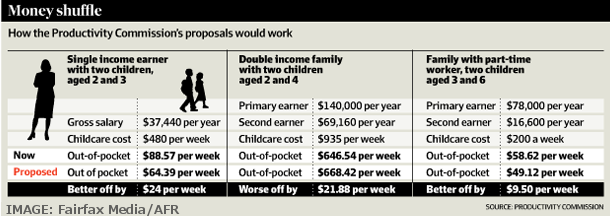Child changes hope to keep care cheap
 A long-awaited major review of Australian childcare has called for a single means-tested payment and federal funding for nannies.
A long-awaited major review of Australian childcare has called for a single means-tested payment and federal funding for nannies.
The 1000-page Productivity Commission's report on childcare and early childhood is set to inform the Coalition’s new childcare policy.
It includes a range of ways to use extra money - saved by scrapping Tony Abbott’s signature “gold-plated” paid parental leave scheme - to help the poor and middle class.
The review also aims to minimise increases to a childcare support system that cost taxpayers $5.7 billion last financial year.
The Commission found the current system to be needlessly complex, and suggests replacing the multi-tiered benefits with a single, means-tested subsidy.
It would subsidise 85 per cent of childcare costs for families with incomes at or below $60,000, but cover just 20 per cent for families earning $250,000 or above.
The payment would cover up to 100 hours of care per fortnight for children 13 years and under, if their parents work or study at least 24 hours a fortnight.
There would be an exemption on the work hours requirement for families on income support, where the primary carer is a grandparent, or if a child is deemed to be at risk of neglect or abuse.
The commission also recommended that families should be able to use federal funding to pay for nannies. It said that there would have to be an expansion of the approval and qualifications for nannies.
Social Services Minister Scott Morrison told Fairfax Media that the nannies idea would require some thought.
“If everyone goes off and becomes a nanny, there will be no one working in childcare centres,” he said.
“I think the recommendation reflects an observation that there needs to be a greater array of services offering to deal with a much more diverse range of needs,” he said.
The final report does go into detail on ways to streamline childcare quality regulation, including teacher qualifications and staff to children ratios.
The commission suggests speeding up the assessment process for rating childcare centres.
It also calls for anyone working with children under three to hold or be working toward a Certificate III in early childhood education, with the supervision of someone who has the qualification.
The Commission estimates that if the government takes on its suggestions, about 16,400 more mothers would start work.
Other recommendations include:
- Allowing au pairs to work for a family for up to 12 months instead of the current six months
- Funding for extra childcare providers in rural and regional areas if existing centres become financially nonviable
- Having the Human Rights Commission and similar bodies try to increase awareness about people's legal rights to flexible work
- Removing the caps on the number of occasional childcare places
- Ditching a requirement for occasional childcare centres to be open for a set number of hours to receive subsidies
- A 100 per cent childcare subsidy for children who are deemed to be "at risk" of neglect or abuse
- The continuation of federal government fund 15 hours a week of preschool
- School principals taking responsibility to ensure that there is before and after school care services for their students








 Print
Print